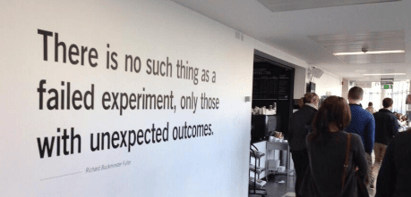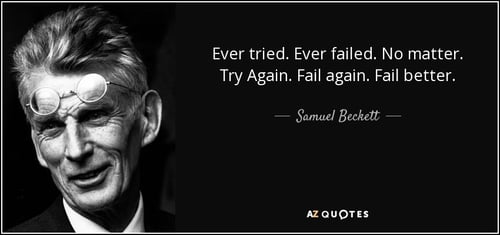This post was contributed by guest blogger Sean Mac Fhearraigh, co-founder of www.assaygenie.com.
No matter what facet of academia you are in, grant writing can be the lynch pin that results in your success or failure and demands attention, practice, and honing of your skills from the start. Just like with any sport, hours of practice are required and no one lab or professor becomes an overnight success. Below I have detailed some tips to improve your grant writing and hopefully increase your success rate.
1. Submit your grant early!
First off, and perhaps the most important bit of advice I can suggest, is to give yourself plenty of time when writing a fellowship proposal. Yes, yes, I hear you saying “We know this already!” But, you do need to be able to research and write your application, then give it to someone else to read and / or give yourself a bit of a break before you read over it again with fresh eyes and correct it (and, believe me, you will need to correct it). It’s easy for reviewers to spot when an application is rushed (whether the idea isn’t properly researched / developed or the application is full of typos) and these are unlikely to get past the initial round of screening. I STRONGLY recommend that you ask a PI or mentor (your supervisor/ a previous supervisor / someone else in the department) to read over your application and give you feedback. They’ve most likely been through the process themselves many times and will have useful advice about what reviewers in your area are looking for. Remember though, you need to leave them time to read it, give it back to you, and for you to make the relevant alterations before submitting - handing them your application 3 days before the deadline isn’t going to be much use.
2. Originality is essential for grant success
The two most important things reviewers will be looking for in your research proposal are originality and relevance. When reading through your proposal, ask yourself: is it clear how novel my findings will be and why these findings will be worth knowing? This can sometimes be tricky, as most of our research builds on ideas and findings from our own or other groups, but your work must be original (otherwise why would you be interested in it?) so make sure that comes across. Check out some in-depth grant writing tips at the Human Frontier Science Program's website.
One way to add originality to your work is to collaborate with specialists in different fields that can provide different insight into an area - not just working within the established network of your peers. Furthermore, using new technologies to solve a problem can allow you to approach that problem in a novel way. Finally, engineering new applications to solve problems will provide originality to your work and possibly a new perspective on the field.
3. Highlight your network and your collaborators
It’s a good idea to move around to different labs during your career; you learn new techniques and interact with new people. If you are looking to move to a different university, perhaps in a different country, choose where you go carefully. Funding agencies want value for their money so you need to make it clear that you will be doing your research in a group or facility that is a world leader in your chosen area of research (either because of expertise, equipment, or excellence of the institution). Likewise, if you’re staying in the same lab where you have been working for the last few years, you need to be very clear that you are staying because it is the best place in the world for your research to rapidly progress.
Need Help Building Your Scientific Network? Check out Our Networking for Scientists Series
4. Become a science communicator
More and more fellowship applications are asking for a 200-300 word explanation of your research for non-scientists. Most fellowships are funded by the general public (either through taxes or charitable donations) so there is an increasing realization that, if we want people to keep contributing to science, it would be helpful for them to know what we are doing and why. I always ask kindly friends and family to read my non-expert paragraph and point out words or sentences that are unclear. We’re so used to conversing with other scientists that we forget that some of the terminology we use routinely isn’t common to non-scientists and may make your perfectly reasonable paragraph unintelligible to a lay audience.
My lay paragraph typically includes a couple of sentences of introduction to my area, a line about the research I will be doing, and a line about what I hope to discover. This section may make the difference in whether you get funding or not; applications for funding from charities, commercial organizations, or universities may have someone senior from accounts or HR on the judging panel. It’s important for this person to get a clear and concise explanation as to why they should give you money.
Check out the Addgene Blog for Some Ways to Improve Your Science Communication Skills
5. Practice makes perfect, apply for small grants too
There are actually quite a lot of different pots of money available for researchers, so look into applying for smaller grants from within your institute or a private funding body. Success breeds success and I have certainly found that the experience I gained in writing small travel grants to attend conferences and a seed funding grant for a proof-of-principal study were very helpful in assisting me with applications for much larger fellowships. Also, if you were awarded money to carry out research, be sure to make it clear what the outcome of the work was. Ideally this would be results published in a paper, but positive outcomes can include poster presentations, talks about your work, or even the successful use of your preliminary data to secure further funding. Make it clear that you intend to be productive with the granting agency’s investment.
6. Failure is part of the process, keep your head up!

It’s very likely that at first (and second) you won’t succeed, but you must try, try again. Now, this does not mean that you should apply for everything that’s out there, it just means that you shouldn’t give up when your applications get rejected on some occasions. Strategize, choose calls that suit your career stage / research area, and focus on producing a good quality application. Even following this advice, only about 50% of my grant applications have been successful. Looking back at my successful applications, I can't always find something that made them better than my unsuccessful ones. With grant applications there’s going to be an element of luck involved so it’s important not to throw in the towel if 1 or 2 funding bodies say no. If possible, get feedback from the funding body through their scoring system or meeting with their grant submission panel. Some funding bodies provide opportunities to attend an overview of what they are looking for in grant submissions and will direct you on how to submit your work either through seminars or webinars. Sending on your grant application to your peers and collaborators can also help you get some critical insight into what you're doing wrong. All this helps to improve your application for the next grant cycle.
Many thanks to our Guest Blogger, Sean Mac Fhearraigh!

Additional Resources on the Addgene Blog
Topics: Science Careers, Early Career Researcher






Leave a Comment